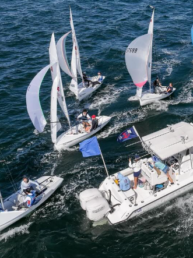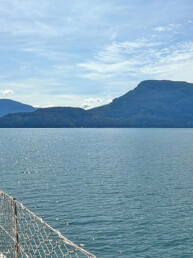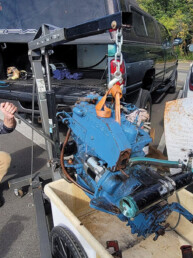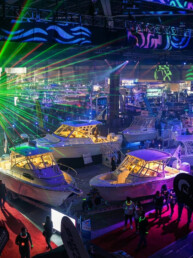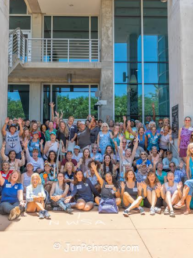I’ve been thinking about time lately. The aspect of time that I have been thinking most about, however, is how I perceive it when I am spending time in small boats out on the water. It seems different from the other ways I experience time. I have come to think of it as boat time. It seems more elastic than clock time, either expanding or contracting when I am immersed in it. And these experiences of boat time are almost always intensely vivid, thanks to their deep in-the-moment engagement of happiness, focus, and occasionally struggle.
This has happened all my life. The first instance I can clearly recall was when I was 14, during a canoe trip with my Boy Scout troop that took us through a series of small lakes connected by slow-moving marshy rivers. In the late evening of our third day out, we were heading for a campsite at the far end of one of those lakes when a thunderstorm that had been brewing for some time descended on us. The wind, rain, and fading daylight reduced the visibility to near zero. We lost sight of the other canoes and entered a zone where time ceased to be. There was only the endless movement of our arms as we paddled and bailed in the darkness, wind, and rain. It seemed like forever, but to this day I could not tell you how long it took, by the clock, to reach the other end of that lake. When the storm finally passed, the campsite hove into view, and the normal flow of time resumed.
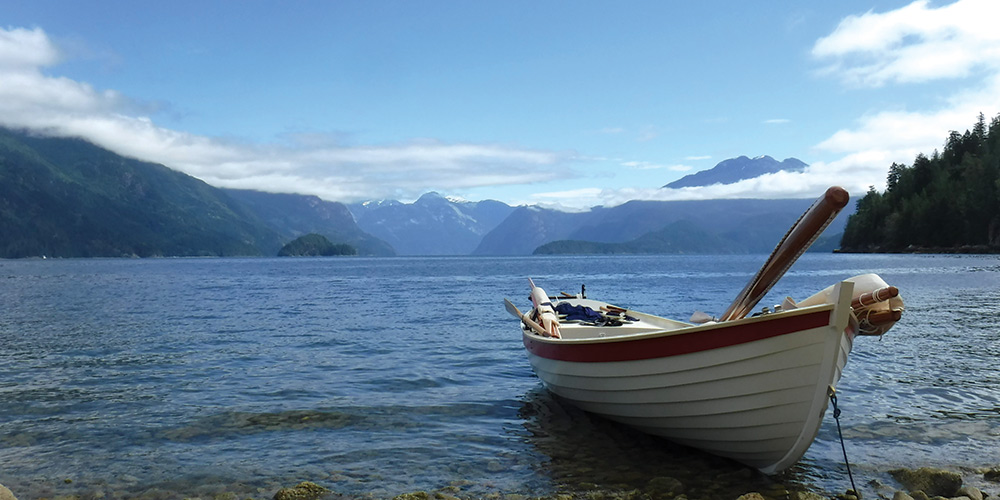
More recently, nearly 50 years after that canoe trip, I experienced another example of boat time. It occurred on my last day in Grenville Channel during my trip south down the Inside Passage in my sail and oar boat, Fire-Drake. From my overnight anchorage in Lowe Inlet, I rowed all morning in the calm and dropped the hook about noon for lunch. As I got ready to go again, a moderate breeze came up on the nose, just right for sailing. The afternoon was wonderful, under hazy but bright skies, the moderate wind gave me enough power to sail, while the sea state remained low.
I made tack after tack across the channel, paying close attention to the helm and sail trim to make the best speed to windward. It was a tacking duel against myself with no one to witness. The least lapse in attention and I would lose a half a knot to a knot. I was completely engaged in sailing, and the concept of time dissipated entirely from my consciousness. Time only started to surface into my awareness again as the wind faded and the tide turned against me while I approached Sainty Point.
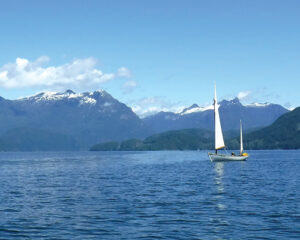
The lighthouse on the point marked both the effective end of Grenville Channel and the corner to a channel leading eastward. I had vaguely thought of spending the night at the nearby community of Hartley Bay and I started to think about how far I still had to go to get there. I looked at my watch as I transitioned from sailing to rowing and was genuinely shocked to see that it was then 7:30 p.m., seven hours of chronometer time since I started sailing, but only a measureless instant of captivating boat time.
Experiencing or conceiving of time in different ways, depending on the context or the circumstance, is not a new idea. The ancient Greeks conceived of at least three types of time and, characteristically, those concepts were embodied or personified in their gods. The god Aion was associated with eternal or perpetual time, which for the Greeks was a recurring phenomenon, with the idea that time had no beginning or end but was cyclical, with all past things eventually returning in the future. Aion gave us the modern word eon, which we now apply to geological lengths of time.
Kairos was a minor deity associated with luck and opportunity. Kairos time for the Greeks was the time to act at an opportune or appropriate moment, the fleeting time in which to take action, which may never come again. I can’t think of an equivalent modern word.
Chronos was the god of linear time, time that we measure with a clock (origin of the word chronometer). He was often depicted as an old grey-haired man with a beard, sometimes wielding a scythe—old father time who waits for no man.
Most of us are acutely conscious of Chronos time. We live our lives by the clock, we catch trains or airplanes, we attend scheduled meetings, and we parcel out our lives in minutes, days, weeks, and years. Our modern technological civilization depends on ever-smaller and ever-more-precise definitions, so much so that we find it necessary to define a second as 9,192,631,770 oscillations of a cesium-133 atom. The GPS systems that we use to navigate depend on this precision, but even that precision is not enough for them. They also must account for the effects that occur due to Einstein’s Theory of General Relativity. One of the effects is that time moves differently for the GPS satellites in microgravity than it does for us down on the water, because time is actually inseparable from space, mass, and gravity.
As Stephen Hawking put it in his 1988 book, A Brief History of Time, “In the theory of relativity there is no unique absolute time, but instead each individual has his own personal measure of time that depends on how he is moving.”
As a sailor in a small boat, I know that I am moving so slowly relative to my surroundings that my own literal chronometer measure of time is no different from anyone else’s, but the idea of a time experience that depends on how you are moving strikes a chord with me. Moving in a small boat, I experience a kind of visceral or intuitive time, which I would argue is a fourth, subjective kind of time, different from any of the three types of time that the ancient Greeks named—boat time.
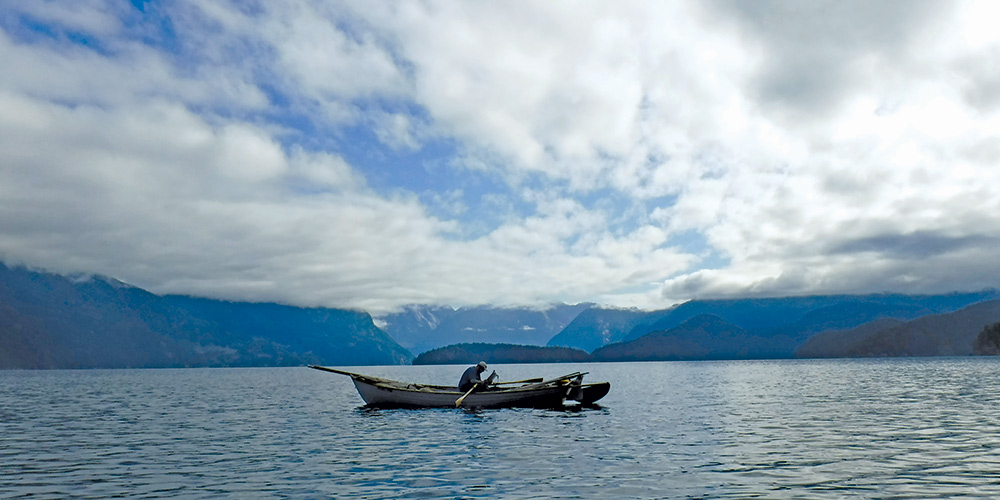
While most of my boating experience has been in small boats, I have also encountered boat time in larger boats. One occurrence that stands out for me happened during an offshore passage on my friend Peter’s 32-foot sloop, when I helped him and his wife Mary sail it from Victoria to San Francisco. We were off the coast of Oregon when the wind died on the morning of the fourth day out. After wallowing about on the windless swell with sails slatting for most of the day, a light north wind came up during the second dog watch. We happily hoisted the spinnaker and set off downwind, hand steering, as there wasn’t enough apparent wind for the self-steering gear. I was on watch from 8:00 p.m. to midnight and my friends went below to get some sleep before they came back on watch.
It was a fine night, clear and not too cold. I settled down in the cockpit, tiller in hand, to concentrate on steering to keep the spinnaker filled and the boat moving. It was a moonless night, with only the zodiac of the stars to mark any change, and that was almost imperceptible as they revolved slowly around Polaris. The task was mesmerising, watching the just-discernible balloon shape of the spinnaker in the starlight, but it required increasing alertness as the wind gradually built throughout my watch. The steering became more sensitive so that if I let my attention wander, one of the edges of the sail would start to collapse. I was so focused on the steering that I completely lost track of the clock time. When Peter poked his head out of the hatch, I wondered why he had gotten up early. I was a little startled when he told me that it was nearly midnight. The four-hour watch had flown by in a fleeting moment of boat time.
The boat time that night didn’t end with the watch handover. I had become so attuned to the sea state, boat, and spinnaker that I had it all balanced and under control, but when Peter took over the helm, he couldn’t stop it from oscillating and collapsing in the strengthened wind. It was clear the sail would have to come down, but it was at least a two-person job to shift to the right set of sails for the changed conditions. Although I was technically off watch, I helped Peter douse and stow the spinnaker. We then had to bring up the twin jibs from below, hank them on, hoist them, set up their whisker poles and get them trimmed properly. Now that I was no longer on the tiller, I was suddenly tired from being awake all day and from the continuous effort of steering. The work felt never-ending and seemed to go on for hours—unsnarling tangled lines, grappling with unruly sailcloth and recalcitrant pole ends under the uncertain glow of the spreader lights while the dark water rushed by on either side. In reality, when we were finished and I went below, it had only taken an hour.
I have had many experiences of boat time over the years, and the intensity of these moments makes them nearly indelible in my mind’s eye. I have vivid memories of specific weeks spent kayaking or sailing or rowing from decades ago, but have almost no recollection of events from the rest of those years. As with the three episodes I related, I can sometimes recall entire days of paddling, rowing, or sailing when I was not aware of time passing. I treasure those memories, but have a hard time explaining why they should seem so valuable to me. Perhaps it is the intense connectedness with the natural world. Perhaps it is the profound integration of mind and body that I experience. Perhaps it is both. Or maybe it is something that defies rational description, but which feels right and true.
So, here’s to boat time, and may we all have more of it.
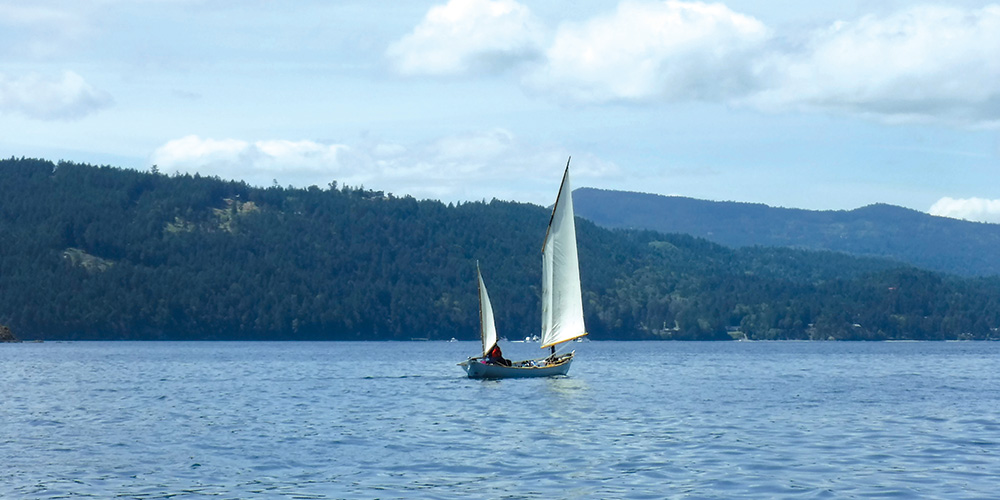
Alex Zimmerman retired from a career in engineering to better pursue his lifelong avocation of boating and amateur boatbuilding. He writes about boats and the people who sail them. He is the author of Becoming Coastal, a book about 25 years of small boat voyaging along British Columbia’s coast. He swears he could stop building boats any time he chooses to…really.

